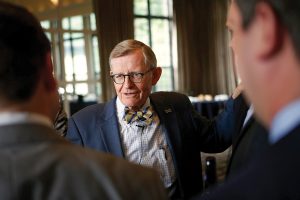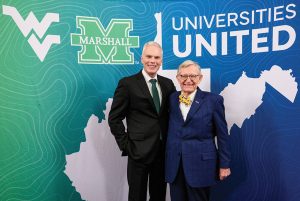In the history of higher education in America, no individual has signed more diplomas than Dr. E. Gordon Gee. That’s because no person has served as president of more universities – five – than Gee. In 2009, TIME magazine ranked him as one of the top 10 college presidents in the United States. By nearly all accounts, Gee’s career spanning more than four decades is unprecedented.
Today, at age 81, Gee is winding down his second stint as president at West Virginia University (his first was from 1981-1985). But in June, the affable and charismatic leader known across campus for his trademark bow ties and horn-rimmed glasses will officially retire. When he does, leaders from across the state say the legacy he’ll leave behind will have a profound impact on West Virginia for years to come.

In Morgantown, Gee is credited with enhancing nearly every aspect of WVU, including education, fundraising, alumni engagement, research and the student experience. Not satisfied with merely raising the bar at the university, he and his staff worked to advance the delivery of health care and expand economic development efforts statewide. He helped lead efforts to recruit remote workers to the Mountain State, attracted entrepreneurs by marketing West Virginia as the “Startup State” and launched initiatives to reverse the exodus of young people. 
“No one has done more in the last 10 years to move West Virginia forward than Gordon Gee,” noted Steve Roberts, president of the West Virginia Chamber of Commerce. “Whether it has been higher education, health care, economic growth or innovative solutions to the challenges we face, President Gee has played a central role in nearly every advancement we have made.”
Born in Vernal, Utah, Gee grew up as a member of the Church of Jesus Christ of Latter-day Saints. He headed off to the University of Utah in 1962 and during his sophomore year went on a Mormon mission to Bavaria, where he learned both German and Italian. After graduating with a bachelor’s degree in history, he enrolled at Columbia University, earning both a law degree and a doctorate in education.
At the age of just 37, Gee was named president of WVU in 1981. He stepped down in 1985 and went on to serve as president of four other prestigious universities – the University of Colorado, The Ohio State University (twice), Brown University and Vanderbilt University – before returning to WVU in 2014.
“It was a gift to be able to return to West Virginia,” he recently recalled. “It gave me a whole new perspective that I didn’t have during my first tenure at the university. I truly admire the grit and determination of the people. And with West Virginia’s natural beauty, quality of life and low cost of living, I think both the university and the state have underestimated their potential over the years.”

Gee was 70 when he began his second stint in Morgantown. Despite his age, he worked at a frenetic pace to complete a master plan for what he titled “the four pillars of progress” – education, health care, prosperity and purpose.
To elevate WVU’s national profile, Gee significantly expanded its research efforts. He hired faculty who conducted research in the classroom and at the WVU Heart and Vascular Institute, WVU Rockefeller Neuroscience Institute and WVU Cancer Institute. By 2016 the university had attained R1 status, a
designation that The Chronicle for Higher Education said placed WVU “among the most prestigious research universities in the country.” Gee described it as “perhaps my biggest source of pride over the past decade.” 
To fund his ambitious agenda, Gee presided over a decade of historic fundraising, including a capital campaign that brought in more than $1.2 billion. Since 2019, WVU’s funding for research has increased by 82%. It should come as no surprise that The New York Times described Gee as “a master fundraiser.”
Gee recognized early on that a prosperous West Virginia must be a healthy West Virginia. As chairman of the WVU Medicine Board of Directors, he grew the system’s footprint from five hospitals mostly in the north to 25 hospitals located in nearly every corner of the state.
“WVU Medicine has been the crown jewel of the university in recent years,” Gee said. “We have attracted some of the best and brightest physicians and researchers in the country. Today, we can provide world-class health care to the people of our state.”
Aware that West Virginia was losing population each year, including many of its recent college graduates, Gee next focused on the state’s lack of job opportunities. To forge a new path to economic prosperity, he helped launch several initiatives:
- In 2017, WVU teamed up with Marshall University and the West Virginia Department of Commerce to launch West Virginia Forward, a program designed to identify sectors for economic growth and strengthen the state’s infrastructure and business climate.
- In 2018, Gee reached out to alumnus John Chambers, the former CEO of Cisco Systems, to seek his support in launching the StartUp Engine program to create a more entrepreneur-driven business climate.
“Our goal is to make West Virginia known as the Startup State,” Gee said at the time. “We have to not only graduate really smart people who are willing to be entrepreneurs, but then we have to keep them here.”
- In 2021, Gee was approached by former Intuit CEO Brad D. Smith and his wife Alys about establishing a remote worker program in West Virginia. With a gift of $25 million from the couple’s Wing 2 Wing Foundation, several projects were born:
First Ascent was developed to help recent graduates of WVU and Marshall University find careers in the state, including remote and hybrid opportunities. 
Next, Ascend West Virginia was created to recruit remote workers to the Mountain State. Those selected would receive $12,000 to move to West Virginia for two years. More than 58,000 applications were received for a limited number of positions.
“Today we have an overabundance of people wanting to move to West Virginia,” Gee stated. “More importantly, we have a 96% retention rate, which is better than the original remote worker programs established in Tulsa, Oklahoma, and Bentonville, Arkansas. Because of that success, we now have Ascend programs to recruit military personnel and teachers. We even have an Ascend program that offers a financial incentive to college graduates who choose to stay in West Virginia.”
Gee said these strategic partnerships and economic development efforts are paying dividends.
“The first time I served as WVU president, our economy was based mostly on energy. Today, we are creating a more diverse economy,” Gee asserted. “For 50 years, West Virginia never attracted a $1 billion company. We have attracted six such companies in the last 24 months. I think the time is right for significant growth in West Virginia.”
The final pillar in Gee’s strategic agenda took shape in 2022 when the WVU Purpose Center was established. Based on the CliftonStrengths assessment, the Center is a personal concierge service for students to help them discover their natural talents and chart their course in life.
“If there’s anything I’ve learned in my 81 years, it is that life is about finding what inspires you and making sure your choices serve that purpose,” Gee said. “WVU’s purpose is to improve not only the lives of our students, but the lives of all West Virginians. What’s more, each of us has a responsibility to support one another. When our state was devastated by floods in 2016 and confronted the global pandemic in 2020 and 2021, we rallied to help one another. When I retire, I want to leave behind a university that encourages people to pursue their purpose and elevate humanity.” 
In 2023, with higher education in America in a state of transformation due to decreasing enrollment and increasing expenses, WVU was faced with a budget deficit. To ensure the financial viability of the university and better meet the needs of students, Gee made a series of tough decisions that drew criticism in some corners. But Gee stood behind his plan.
“Today, the world is changing so fast that if you stand still, you are going to become irrelevant,” Gee explained. “We made all these changes to secure the university’s future health and success.”
As Gordon Gee prepares to step down from the role that has defined the last 45 years of his life, perhaps the greatest compliment that can be paid to his time at WVU is the relationship he shares with the students. He is easily the most popular individual on campus. Young men and women line up to take selfies with the grandfatherly figure. On any given Friday night, you may even find him chatting with students at the bars on High Street.
Leaders from across the state have weighed in recently on the legacy Gee will leave behind.
“Gordon Gee is a national treasure,” said Roberts. “His impact on higher education in America is well known, but what impresses me most is his love for our state and its young people. He has worked tirelessly to stem the tide of college graduates leaving West Virginia.”
“Gordon Gee has been a remarkable advocate for this state,” noted Rick Pill, chairman of the WVU Board of Governors. “His wit, personality and energy are contagious and motivate others to succeed. He truly understands the land grant mission of WVU. In particular, he has expanded the role of our university by working with business and government to bring employers and economic growth to our state. Both West Virginia and WVU have been blessed to have Gordon Gee.”
“Gordon’s career has been a masterclass in leadership, vision and commitment to the people he has served,” said Brad D. Smith, president of Marshall University. “He has not only led institutions – he has shaped them, elevated them and demonstrated that education is the key to prosperity for all. His signature bow tie may be iconic, but his legacy of higher education excellence is even more so.”
With retirement looming this summer, Gee said he’s unsure how he will handle all his free time.
“I’ll probably have hives,” he said with a smile. “I plan to stay involved in state and national issues, but I won’t be doing my annual 55-county tour anymore. I will miss that and being a university president dearly.”
And while Gee looks forward to spending more quality time with his partner, Laurie, daughter, Rebekah, and twin granddaughters, he has no plans of moving to a retirement community in Florida – or anywhere else, for that matter. Instead, he will continue to pursue that fourth pillar in his master plan.
“My purpose has been to make things better for West Virginians and to build a university with the strength and power to succeed long after I am gone,” he said. “This is my home now; this is where I’m going to live and continue to be as involved as possible with moving the state forward. I may have been raised in Utah, but I often say I am a born-again West Virginian. I just hope that I have been a worthy adopted son.”
WVU President Gordon Gee is leaving behind a legacy marked by advancements in academic programs, fundraising, research, health care and the student experience. He is also credited with increasing economic development efforts to reverse the number of young people moving away from West Virginia.





